Saskatchewan Health Authority implements a novel Indigenous hair consent directive
Saskatchewan Health Authority Introduces Indigenous Hair Cutting Policy
The Saskatchewan Health Authority (SHA) has officially implemented a new policy requiring health staff to obtain consent before cutting the hair of Indigenous patients. This policy aims to address violations of Indigenous cultural rights in healthcare settings, emphasizing consent and cultural respect.
The policy was largely prompted by a series of incidents where Indigenous patients' hair was cut without permission. One such case involved Métis man Ruben St. Charles, whose ponytail was cut without consent before a hip surgery in a Saskatoon hospital in 2024. This incident generated public outcry due to the cultural significance of hair for Indigenous peoples and highlighted gaps in cultural safety in healthcare settings.
The policy states that hair should only be cut when medically necessary and only with consent from the patient, family, or a designated decision-maker involved in the patient’s health. The SHA has recognised the spiritual and cultural importance of hair and braids to First Nations and Métis peoples and acknowledged that cutting hair without permission causes emotional and spiritual harm tied to past cultural trauma.
To complement this policy, the SHA has implemented mandatory cultural responsiveness training for all staff and physicians. By August 2025, over 90% of SHA staff had completed this training aimed at improving cultural safety and respect.
The policy represents a step toward reconciliation and more culturally safe healthcare, aiming to respect Indigenous patients’ rights and traditions within hospital environments. While it marks progress, affected individuals such as Ruben St. Charles have yet to receive formal apologies, reflecting ongoing challenges in trust restoration between Indigenous communities and healthcare systems.
The policy has also raised awareness of systemic issues related to cultural safety, with calls from the First Nations Health Ombudsperson for greater accountability and changes to prevent further violations. By requiring informed consent and cultural training, the policy reduces the risk of unintended cultural harm and supports more respectful patient care protocols tailored to Indigenous patients' cultural values.
The SHA's new policy reaffirms their commitment to the Truth and Reconciliation Calls to Action. Dr. Holly Graham from Thunderchild First Nation is collaborating with the Canadian Association of Schools of Nursing to offer a series of virtual workshops, including topics such as Anti-Indigenous Racism, Cultural Humility, Cultural Safety, History of Indigenous Peoples, and Implementing Call to Action #24.
Dr. Graham, who has an online Indigenous Nursing Professional Practice Group for nurses to educate themselves and work toward addressing health disparities, feels that the story of the hair-cutting incidents reflects the word Wahkohtowin, meaning we are all interconnected and related.
The SHA prioritizes providing high-quality, compassionate care that respects each patient's cultural background and lived experience. However, concerns were raised about the lack of Indigenous or Métis representatives during the policy's creation. The SHA acknowledges these concerns and remains committed to ongoing dialogue and collaboration with Indigenous communities to ensure the policy continues to meet their needs.
- The new health policy implemented by the Saskatchewan Health Authority (SHA) focuses on mental health and wellness, as it acknowledges the emotional and spiritual harm caused by hair-cutting violations, which are deeply tied to Indigenous cultural trauma.
- In addition to the new policy, the SHA has introduced policy-and-legislation reforms, such as mandatory cultural responsiveness training for all staff and physicians, to promote cultural safety, respect, and reconciliation in healthcare settings.
- The SHA's policy and legislative changes in the realm of health and wellness have navigated the complexities of politics, aligning with the general-news narrative on systemic issues related to cultural safety, accountability, and the need for continued collaboration with Indigenous communities in drafting informed and inclusive policies.




